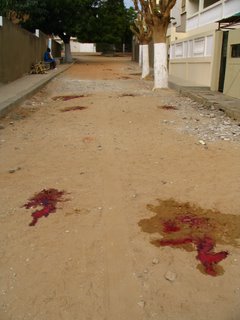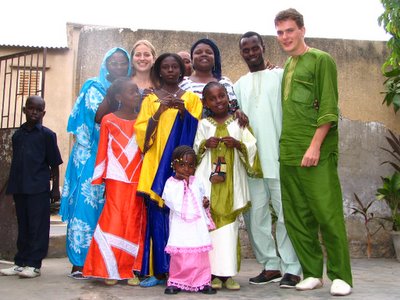Naka lañuy rey xar
'How to kill a sheep.' And as a Tabaski in Senegal will teach you, it's really quite simple. The following is an affectionately mocking step by step guide. This Tabaski tradition clearly isn't pretty, and while I've kept the worst of the photos to myself, I don't recommend this entry for the queezy.
1) Jendal ay xar - 'Buy some sheep'
These can be found in small herds sitting in the dust along most major roadways. Back routes and neighbors can also be good suppliers. A small splotchy male will cost you around 30,000 CFA, ($60) but if you really want to impress you're relatives you'd better invest in something a little more quality. Might I suggest a plump, handsome fellow who lathargically munches out of an old tire down the road from my house. He's scrubbed to a pure white perfection, and sports an impressive set of mangled horns. Yes, he'll set you back a hefty 80,000 or so, but just think of all the brochettes you'll have for your relatives, not to mention what you'll be able to give away to the Christians and poor folk in your neighborhood. If you're a minister or important official, you're more likely to invest in the extreme upper end of the scale, dishing out 200,000 or more for a real whopper. Keep in mind that you have to buy at least one sheep for each wife in your household.
 (A freshly emptied sheep station on Tabaski)
(A freshly emptied sheep station on Tabaski)2) Gasal benna kambb - 'Dig a pit'
Sheep killing is a dirty business, and without particularly efficient waste disposal services, you'll need to make your own arrangements. Fortunately, Dakar is full of dirt streets, alleys, and courtyards ripe for the digging. Don't worry if your neighborhood is pathed-over, you can always just hack up the road in front of your house, or else pry open a nearby sewage grate and dump down plenty of water once you're finished.
However, even with the best of precautions, the concentration of ship bits on Dakar's streets will inevitably rise after Tabaski. As long as you do your best, your neighbors will certainly forgive the occasional foot or horn that ends up in the side alley.
3) Jëngal xar bi - 'Tie up the sheep'
This is where the sheep's previously relaxed, uneventful life starts to go wrong. Senegalese sheep are accustomed to having their four legs tied together so that they can be loaded onto the rooves of ancient and precarious passenger buses for inter-city transport. However they seem understandably anxious about this event on Tabaski morning. At least they've led relatively quiet, normal sheep lives up until this point.
 (This poor fellow's time is up. The first of four at my neighbors' house in Mermoz.)
(This poor fellow's time is up. The first of four at my neighbors' house in Mermoz.)By the way, if you're concerned about what to do with the sheep between buying it and tying it up Tabaski morning, have no worries. In Dakar, back courtyards, rooves, and even unfinished rooms in your house can serve as perfectly acceptable sheep pens. In fact, the constant, low-level baa-ing of the neighborhood flock is an icon of the Dakar night.
4) Boomal xar bi - 'Kill the sheep'
(11:30 am in an alley near my house in Mermoz. The baa-ing of previous nights has come to a rather abrupt end.)
 This important step is happily done quite quickly over your pit. The requisite tools suddenly show up all across Dakar during the week before Tabaski. Vendors tote knife sets along rows of taxis and at bus stops, while others sit at intersections with piles of assorted blades, machetes, and even the odd hatchet to help get the job done.
This important step is happily done quite quickly over your pit. The requisite tools suddenly show up all across Dakar during the week before Tabaski. Vendors tote knife sets along rows of taxis and at bus stops, while others sit at intersections with piles of assorted blades, machetes, and even the odd hatchet to help get the job done.A quick gash to the throat finishes off the sheep without much fuss, and be sure to keep as much as possible in the pit. Repeat this step as necessary until you run out of sheep.
5) Teegil der bu xar - 'Skin the sheep'
This step highlights traditional Senegalese values and gets the whole family involved. The men, sometimes instructing their older sons, get the skin itself off and do must of the rough cutting. This uses the small sharp knives you purchased along the road, if you could afford it. Otherwise it's going to be a rough job.
I've heard one report that miracles can be worked if you simply seal off the sheep's neck and insert a bicycle pump into a hind leg... However, not everyone agrees whether this is kosher with Islam. The hatchet will be useful in getting off the legs, as well as for the rather messy task of breaking into the skull. While seemingly non-essential, this extra step yields the small but delectible bits of meat that are vital to a good soup.
(The dirty work chez my neighbors in Mermoz.)
 The various categories of cuts are sorted into plastic buckets and then passed off to the women and girls, who remove (only some portion of) the fat and bone, and prepare the meat for the grill. In the mean time the men wash up and get ready to do some serious sitting around.
The various categories of cuts are sorted into plastic buckets and then passed off to the women and girls, who remove (only some portion of) the fat and bone, and prepare the meat for the grill. In the mean time the men wash up and get ready to do some serious sitting around.6) Toggal yap bi - 'Cook the meat'
Another item that appears along the bi-ways of Dakar come Tabaski is the patch-work Senegalese grill. This ingenious little piece comes in many shapes and sizes, banged together from bits of scrap metal collected from aluminum cans, old appliances, and goodness knows what else. Filled with locally-produced charcoal, it certainly get the job done.
 (Keru [the house of] Astou Ndiagne, one my kindest friends, who runs a sandwhich stand at Suffolk University.)
(Keru [the house of] Astou Ndiagne, one my kindest friends, who runs a sandwhich stand at Suffolk University.)The choice meat is grilled as brochettes, while ribs and a fair number of organs (which are by no means to be considered less savory) are grilled and steamed in a pile.
To garnish, cook up a batch of potato fries cooked in peanut oil, a sweet onion yassa sauce, and (Alxamdulilahi!) in the case of the vitamin-conscious family I ate with, an astounding variety of chopped vegetables. But I must emphasize: all non-meat ingredients are to be considered strictly non-esential to this Tabaski feast.

7) Lekkal! - 'Eat!'
Serve in wide, communal bowls (seperate for men and women if desired) with mayonnaise and plenty of kani (hot pepper) dressing. Eat with your right hand, holding a chunk of fresh French bread in your left. If you're the sort of person who dreams of eating fresh grilled meat three times a day (and most Senegalese are) this will be the festival of a lifetime. Mine was a very happy Tabaski.
Reesal ak Jam! - 'Digest in peace!'
 (Añ bi pare na. Lunch is finished. From left: Nathalie, Aram, Catherine, Ami, Astou's neice, Astou)
(Añ bi pare na. Lunch is finished. From left: Nathalie, Aram, Catherine, Ami, Astou's neice, Astou) (Boubou time. Just before the children head out to levee a heavy tariff of money and candy. There are three festivals in Senegal that incorporate this Haloween-like element.)
(Boubou time. Just before the children head out to levee a heavy tariff of money and candy. There are three festivals in Senegal that incorporate this Haloween-like element.)


1 Comments:
With the widespread usage of metals such as aluminium, steel and iron, the scrap metal prices of these metals have been on the high since the past several years. The prices of scrap iron are constantly on the rise as iron is used for construction purposes extensively.
Metal Recycler
03:29
Enregistrer un commentaire
<< Home